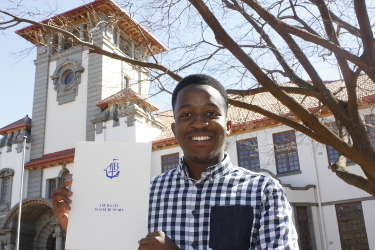Latest News Archive
Please select Category, Year, and then Month to display items
12 January 2024
|
Story Nonsindiswe Qwabe
|
Photo Sonia Small
 Since joining the UFS in 2008, Dr Grey Magaiza has worked extensively on approaches that can foster the socio-economic transformation of societies.
Since joining the UFS in 2008, Dr Grey Magaiza has worked extensively on approaches that can foster the socio-economic transformation of societies.
“The future should be one where communities can decide on their development agenda and futures. That’s the most important for me.” Dr Grey Magaiza, Deputy Director of the Centre for Gender and Africa Studies (CGAS) and Head of the Community Development programme on the Qwaqwa Campus, is passionate about capacitating communities to be agents of change and advancement. His vision for the future emphasises the empowerment of communities to take charge of their development by actively participating in decision making and the implementation of development projects that can improve their lives.
Since joining the UFS in 2008, Dr Magaiza has worked extensively on approaches that can foster the socio-economic transformation of societies. Over the years, he has crafted his research speciality into one that he is most proud of – being an interdisciplinary scientist immersed in the development of communities.
“I’m in a fortunate position of researching what I like. I say ‘fortunate’, because I’ve taken the time to understand what I’m passionate about, which is the overall field of rural livelihoods and livelihood futures – in short, community development. My research starts from an engaged university, understanding the elements that a university must use to enhance transformation and relevance to its immediate community in terms of development.”
One of the ways he has done this is by looking at social entrepreneurship as a development approach for young people in a rural setting. Through workshops with non-profit and civic organisations in Qwaqwa, Dr Magaiza has been helping these organisations to map out their needs and actively meet them through the involvement and support of external role players.
“We understand that communities are part of the national development agenda, but even that national agenda respects community knowledge and intentions and allows communities to shape their identity. A critical enabler of this is community organising. You bring back the capacity in communities to have dialogues on issues affecting them as spaces for engagement, knowledge exchange, and for people to just talk about their way forward.”
By enabling communities to define their development agenda, they can address their specific needs, challenges, and aspirations, he said. “When I look at livelihood futures, it’s quite an exciting aspect of my work – it’s like looking into a fortune tellers’ globe, because you’re not deciding for communities what they should do, but the communities themselves take those decisions.”
Perseverance is key for 2017 Abe Bailey recipient
2017-08-23

Gosego Moroka, recipient of the 2017 Abe Bailey Travel Bursary,
says his never-say-die attitude is what helped him win the bursary
the second time round.
Photo: Rulanzen Martin
A valuable life lesson can be learned from Gosego Moroka. The fourth-year LLB student was in the top three for the 2016 Abe Bailey Travel Bursary which was awarded to Candice Thickeson. And now in 2017 Moroka is the recipient.
“It means the world to me as it shows that perseverance is the key. I took last year’s loss as a lesson which I would use to improve as a candidate this year and I’m ecstatic that it came full circle.”
Bursary aims to broaden views
The educational tour will start on 21 November 2017. “We will be travelling to the African Union in Addis Ababa, Ethiopia, and then to London, Oxford and Cambridge universities in England, as well as Edinburgh University in Scotland,” Moroka says. The tour group will be hosted by Goodenough College in England. The bursary aims to broaden the views of young South Africans by providing outstanding students the opportunity to engage with students from other universities.
Comprehensive application process
The application process starts with a motivation letter by the applicants stating the reason for applying. They must then submit letters detailing their leadership roles in the community, school, and at university. This is followed by an interview process. “The university will recommend three persons as possible bursars,” Moroka says. The Abe Bailey Trust will then, with the recommendation of the university, make its own decision in selecting the successful candidate.
Great achievement adds to repertoire
“This achievement was extremely important to me as it is testament that greatness is something one works towards.” Moroka is a former 100m South African champion and is part of the Golden Key International Honour Society. And now he is an Abe Bailey Bursar.